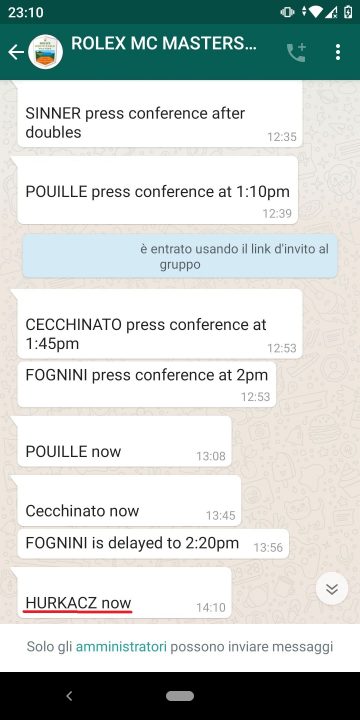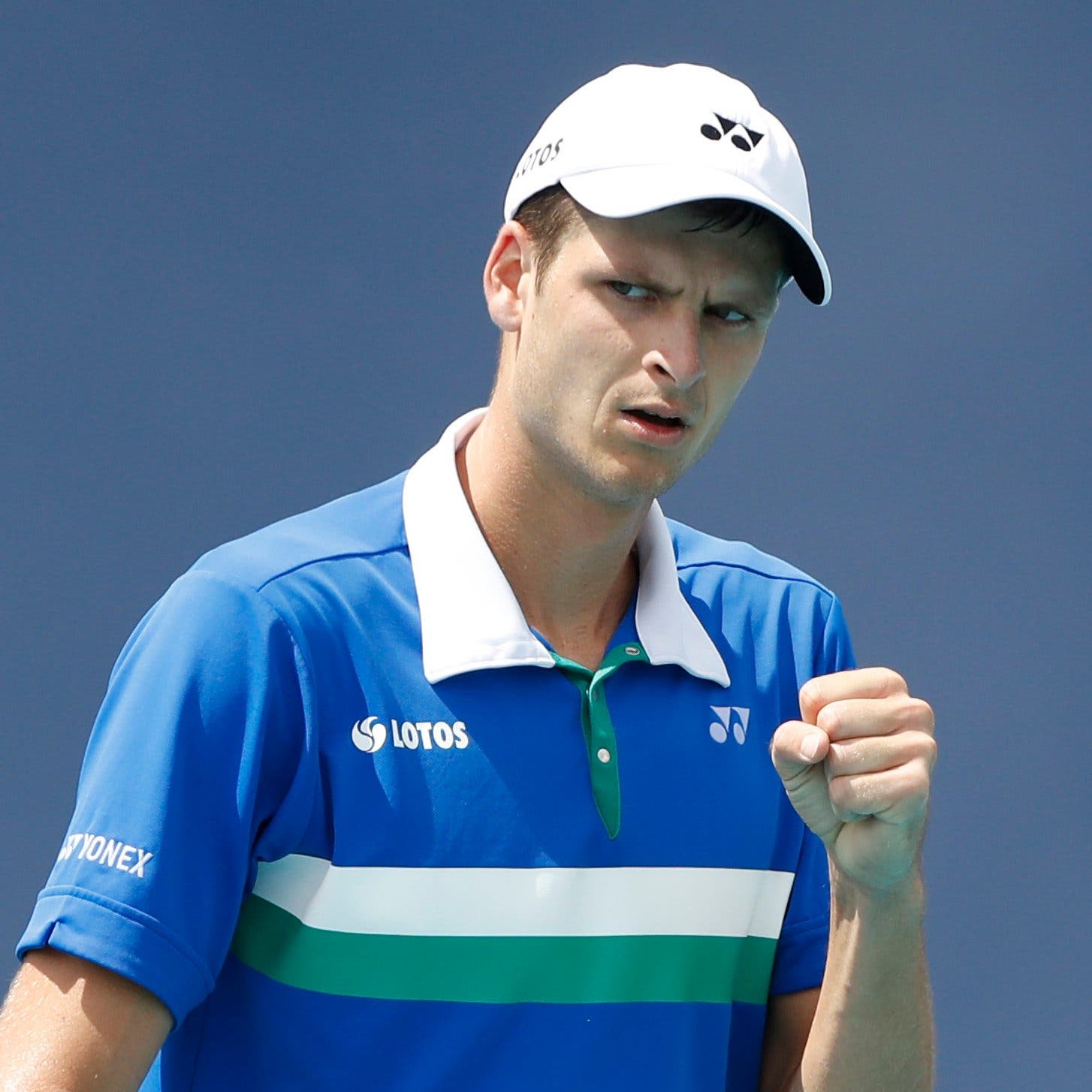Among the funny videos published by Tennis TV last Tuesday on their social media accounts, there is some footage from Hubert Hurkacz’s press conference after his successful debut in Monte Carlo against Italian qualifier Thomas Fabbiano.
No journalist was connected with the press conference (let’s remind everyone that even the few journalists present onsite in Montecarlo are required to use video conferencing to talk to players, due to the ATP’s COVID-19 protocol), nobody asked questions to the Miami Open champion, who was able to fulfill his press obligations in less than a minute recording a vocal message in his native language for the Polish press.
The ATP did not appreciate having to submit the player to a press conference where no questions were asked, especially because it happened twice on the same day: Dusan Lajovic, too, was taken to the interview room after his defeat against Daniel Evans, but no questions were asked.
And it almost happened the same also to Fabio Fognini: at the start of his press conference, only Ubaldo Scanagatta and Alessandro Stella from Ubitennis were connected online. As some of you may know, Fognini does not talk to Ubitennis and has been doing so for several years, but in order to avoid another debacle, the ATP moderator invited Ubaldo to ask a question and Fognini felt compelled to respond.
Of course, social media users were quick to blame the accredited media addressing all sort of insults towards those journalists present in Montecarlo (although very few were actually present at the Country Club, but not many people knew that) who they believed were guilty of snubbing Hurkacz’ press conference, probably because they were not very familiar with press conference procedures.
Before I move on to explain what has happened, just a few words from me: I have not decided to write this piece as a justification for journalists, neither to complain about the problems we face while doing our job. Nobody is forcing me to do what I do, I’m here by choice and I am happy to do what I do, but I would like to explain that sometimes things are not as black-or-white as they may appear at first.
Every media accredited to a tournament is entitled to request an interview with a player on a day when this player is scheduled to compete: the request has to be submitted in writing to the ATP Communication Manager in charge, normally by email, as early as possible during the day. It has to be specified when we want to talk to the player (normally, after their match, or their last match if they play more than one), if we are requesting a one-on-one interview or a press conference for multiple media to attend, and if we want to talk to the player regardless of the result of the match or only if they win.
Evidently, someone had requested to talk to Hurkacz, but then decided not to take part in the press conference. This should not happen, but let’s see how events may have unfolded.
Usually, at the end of the match, an ATP Communication Manager approaches the player, explains to him (or her, in case of WTA tournaments) the requests that have been received and agrees on a time for the media commitments. In case journalists are present on-site, a public announcement is made in the media room about the agreed time for the interview or press conference; since now most reporters are working remotely from home, there is a WhatsApp chat where all the interview times are noted, and a reminder is sent right before the player walks into the interview room.
In this case, no announcement for the time of the interview had been made, and the only message sent on the chat was the one advising that Hurkacz had already arrived in the interview room.

Since last year, all of us who cover tournaments year-round have had to get accustomed to a new way of working, as did many other workers all over the world. While we are present onsite at a tournament, we live and breathe the event, we spend hours and hours in the media room and we are totally absorbed by the tournament. Now that we are watching matches on TV and we work remotely from home, the full immersion effect has gone, and we all need to balance the coverage of tournaments with the tasks of our everyday life. For example, at tournaments journalists can usually avail of a cafeteria to have their meals; at home, I don’t have a cafeteria, if I want to eat, I need to cook my meals myself, and sometimes also go to the supermarket to get groceries. This requires time, and in tournaments where matches start at 11 a.m. and go on until way past midnight (like the Miami Open, for example), this means we sometimes have to find some time to get away from the PC and attend the more mundane tasks of everyday life.
Not receiving any kind of forewarning of when a press conference may take place is incredibly inconvenient, because it does not allow us to plan our work and schedule the breaks to take care of everything else, from doing laundry to walking the dog. Especially because or job is not just attending press conferences, it’s also writing or talking about them, and, from time to time, if possible, watch some tennis matches.
Most certainly whoever had requested the player and then realized they would not be able to attend the press conference, should have contacted one of the ATP Communication Managers to let them know. Maybe there was an emergency and they could not send a message in time, but it’s really good practice to do that. When covering tournaments onsite, we would need to be present “in the flesh” for the interviews we had requested, and if it so happened that we were stuck on a court attending another match, we would normally go out of our way to notify the Communication Managers of our delay. In today’s environment, there may be other mishaps occurring: a sudden call from the boss, a last-minute deadline popping up: this is our job after all.
Some of you may say: but why don’t you take shifts as it happens in many jobs that require extended duty hours? Yes and no. First of all, it’s not that easy to plan shifts not knowing when matches start or end (and interview times are tied to when matches end), with possibly some rain delay thrown into the mix as well. But there are also external problems: not every person in our (virtual) newsroom has access to virtual interviews or to the WhatsApp chat. Tournaments can decide whom to admit at their discretion, and as far as the Rolex Montecarlo Open is concerned, our deputy editor Alessandro Stella, the only representative for Ubitennis in addition to our CEO Ubaldo Scanagatta , was refused accreditation for this year’s tournament because priority had to be given to French or Monaco media.
Ubaldo, who has probably spent as much time at the Monte Carlo Country Club as the custodian, received his confirmation letter just the week before the tournament, and it was only his insistence on being able to delegate some of his staff to attend press conferences that allowed Alessandro Stella to gain access to the virtual interview room. At the beginning of the season, the ITWA (International Tennis Writers Association) requested that generic credentials be given to specific news outlets instead of specific people, in order to allow more flexibility in covering the event, but the request was rejected and referred to the individual tournaments’ discretion.
Therefore, Ubitennis was refused access for lack of space (virtual space, that is), despite the site can boast over 40 million page views a year, it’s comfortably the most important tennis website in Italy (or possibly Europe) and on a “normal” year approximately 35% of spectators for the tournament would come from Italy, to the extent that a launch press conference for the tournament dedicated to Italian media is held each October in Milan. What I am trying to say is that if access is being so constrained, you can’t really complain too much if there aren’t enough people to ask questions at all press conferences, especially during a very busy Tuesday when, due to the rain cancellations on Monday, there were many matches taking place at the same time.
That goes to say that there have certainly been responsibilities on both sides for the mishap at Hurkacz’ (and I’m guessing also Lajovic’s) interview, but maybe there was no need to give so much visibility to a fairly innocuous incident. We are all working in a new environment, we are all adjusting and we can all make mistakes. What is important is that we evaluate those mistakes with the right attitude.






